Introduction
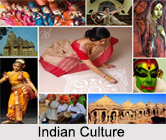 Indian Culture and traditions are something which has now become renowned all across the world. Indian Culture is very diverse and unique and has been interpreted in various ways. There are varied ideas that pass through one`s mind when Indian Culture is the subject to be spoken on. To some philosophical and spiritual beliefs are the bases of Indian Culture. Others say that dreams and ideals as embodied in the best architecture, the sculpture and paintings reflect Indian Culture. Some, on the other hand, point out the various symbolic representations of thought-forms like the concept of Nataraja or the Indian Music with its varied Ragas as the essence of Indian Culture. The South, East, West, North, Central and North-East have their own distinct cultures and almost every state has carved out its own cultural niche. There is hardly any culture in the world that is as varied and unique as India. India is a vast country, having variety of geographical features and climatic conditions. India is home to some of the most ancient civilizations, including four major world religions; Hinduism, Buddhism, Jainism and Sikhism.
Indian Culture and traditions are something which has now become renowned all across the world. Indian Culture is very diverse and unique and has been interpreted in various ways. There are varied ideas that pass through one`s mind when Indian Culture is the subject to be spoken on. To some philosophical and spiritual beliefs are the bases of Indian Culture. Others say that dreams and ideals as embodied in the best architecture, the sculpture and paintings reflect Indian Culture. Some, on the other hand, point out the various symbolic representations of thought-forms like the concept of Nataraja or the Indian Music with its varied Ragas as the essence of Indian Culture. The South, East, West, North, Central and North-East have their own distinct cultures and almost every state has carved out its own cultural niche. There is hardly any culture in the world that is as varied and unique as India. India is a vast country, having variety of geographical features and climatic conditions. India is home to some of the most ancient civilizations, including four major world religions; Hinduism, Buddhism, Jainism and Sikhism.
History of Indian Culture
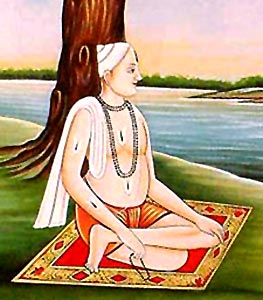 History of Indian Culture begins with the culture prevalent in the Indus Valley Civilisation. Cultural history in the medieval age begins with the death of Harsha Vardhan. This ends with the decline of the Mughal Empire in the eighteenth century. Thereafter India witnesses the British rule. The Britishers tried to impose their way of living and mannerisms some of which has been absorbed into the Indian culture.
History of Indian Culture begins with the culture prevalent in the Indus Valley Civilisation. Cultural history in the medieval age begins with the death of Harsha Vardhan. This ends with the decline of the Mughal Empire in the eighteenth century. Thereafter India witnesses the British rule. The Britishers tried to impose their way of living and mannerisms some of which has been absorbed into the Indian culture.
Ancient Indian Culture
The cultural evolution of ancient India begins with the culture of Mohenjo-Daro and Harappa that dates from 3250 to 2750 B.C. The Vedic period witnessed the rise of tribal chieftainship and democratic assemblies. During the epic period India was divided into a number of kingdoms. The country had witnessed political and cultural upsurge during the Classical Age. Thereafter, Mauryan dynasty ruled the politically important city Magadha. The decline of the Mauryan Empire saw India being divided into a number of independent kingdoms. Foreign races like the Shakas, Greeks and the Kushans had invaded India. Among the kings of foreign extraction the most famous was Kanishka. Some time later the rise of a fresh empire under the Guptas from 319 or 320 A.D. was witnessed. The Gupta period was the golden age of Ind0ian culture. Ancient Indian culture is a treasure house of classical forms of dance. Sage Narada`s Natyashastra is the primitive manuscript that deals with different art forms and had references of dance styles like Odissi, Kathakali and Bharatnatyam.
Medieval Indian Culture
Culture in the medieval period was a continuation of the ancient Indian culture to some extent. Literature witnessed development of the vernacular languages. Various `Apabhramshas` developed now. Tulsidas was a great Hindi poet. The most famous of his work was Ramcharita Manas. Surdas was another poet who wrote in Brijbhasha. The Bengali language also made a significant progress in this period in the realm of poetry. Marathi vernacular developed during this period. The oldest writer is Jnaneshwar who completed his Jnaneshwari in 1290 A.D. In Rajasthan also Vernacular literature had developed. The most famous chronicle was Prithviraj Raso by Chandvardai. The Punjabi literature and vernacular literature in Bihar had also made a marked progress. The Sanskrit literature also continued to make great progress. Many works were written in the field of poetry also. The composition of Kalhana`s Rajtarangini can be sighted as an example. The philosophies of the medieval India were based on the Vedic and post-Vedic philosophical works. They laid great emphasis on love, emotional aspect of man and self-surrender to God. The medieval period witnessed the development of Hinduism with its symbols and mythology. Bhakti cult was dominant. At this time the two most-important schools of Bhakti - Shaivism and Vaishnavism had become popular. Rajput painting and art had developed during this period. Temple architecture gained importance during this period. Khajuraho temples are an example of Temple architecture during the medieval age. Caste system was followed in the society as seen in the previous age. Though agriculture was given a major importance trade and commerce was equally placed on high standards. Many cities became economically important like Madurai, Kannauj and Ujjain and so on.
The Muslim influence on Indian culture cannot be ignored. Muslim architecture, painting and crafts enriched the Indian culture. The development of Urdu language was significant in the medieval age. Dress, manners and food did undergo certain reorientation in following the Muslims. The Muslim society under the Sultans was feudal. The age of the Sultanate presents a vivid contrast between affluence and poverty. Material wealth was concentrated in the hands of the few. The positive feature as far as religion is considered was the intense love of religion among the masses and the development of devotional sects like those of the Sufis.
Culture in Modern India
Modern Indian Culture has primarily been influenced by the rule of the British Empire. Modern machinery of government was created. The rule of law operated by means of the law codes and the courts. English as a language was used in the administration. It gave birth to new ideas Christian schools and colleges were set up. The British administration had destroyed and uprooted the age-old village institutions. Capitalism had forayed into India due to the economic policies adopted by the British. Indian industries were destroyed and the country was forced back to the rural economy. Commercial banks and industries grew during this time. Western influences poured into India through the Middle class society. Untouchability, a social evil was eradicated. Women however were treated on an equal basis. Social consciousness aroused among the Indian masses. The press introduced by the British acted as the spearhead of social movements like abolition of untouchability, widow re-marriage, widows` homes, girls` schools, asylums for the blind and the orphans. Materialism, realism and idealism were new philosophies introduced by the West.
Features of Indian Culture
 Features of Indian culture give the message of prosperity, happiness and eventual peace through its unique features to the whole humanity. Indian culture possesses number of characteristics. It is characterised by tolerance. All races and creeds have found their habitation in India but they have not been persecuted as in the case of the medieval Europe. Equipoise is also a marked characteristic of Indian culture in life as a whole and also in the correlation of its various parts and in embodying in them an ever developing whole in keeping with our conception of God who is the absolute and infinite.
Features of Indian culture give the message of prosperity, happiness and eventual peace through its unique features to the whole humanity. Indian culture possesses number of characteristics. It is characterised by tolerance. All races and creeds have found their habitation in India but they have not been persecuted as in the case of the medieval Europe. Equipoise is also a marked characteristic of Indian culture in life as a whole and also in the correlation of its various parts and in embodying in them an ever developing whole in keeping with our conception of God who is the absolute and infinite.
Harmony is another emphasizing feature of our culture. Happenings are not accidental but occur according to certain order and certain continuity. This is specified in the law of Karma and the transmigration of souls. Ceaseless search after truth has been another characteristic of Indian culture.
During the Stone Age it is said that the inhabitants of India, at that time lived in tribes. They were engaged in agriculture and cattle rearing. Indians lived a collected life and they believed in the principle of non-violence. These influenced the lives of people. The people here faced difficulties collectively and enjoyed pleasure together. They were eager to progress on the basis of non-violence.
Cities revealed at Harappa and Mohenjo-Daro or Kot Digi, Kalibangan, Kathiawad and Saurashtra and excavations in south and east reveal that the life style and social structure of Indians were in a much developed form. Planning and uniformity were also clear. The cities were developed according to a plan. There were provisions to cope up with natural calamities. Cattle shed and grain-houses were there. Items of daily use were in advanced state. Indians had language, script and religious philosophy. Excavations reveal that Indians had contacts with inhabitants of other parts of the world. Joint Family system; custom of arranged marriages and religiousness are the other features of Indian culture.
Though some of these are not followed completely now in India. There were other qualities which explain the culture and social life of India. They are the constant strive towards development; Orderliness, Planning and Unity; Religiousness; and contact and business with inhabitants of other parts of the world. Aryans brought many qualities to this country. They had intelligence, skill and knowledge. They too were proponents of unity and religiousness.
From the Aryan lifestyle, tradition of rites, meditation, faith and rituals began to permeate Indian lives. There was much more comprehensiveness. There was introduction of philosophy in which forbearance and tolerance were supreme. During 326-25 B.C., Alexander had come to India and fought many battles with Indian Kings. It was natural that contact was established between Indians and Greeks. As a result Greek and Indian cultures influenced each other especially in the war, philosophy, poetry, sculpture, architecture, theatre and literature.
After the death of Emperor Ashoka, Shakas from Iran arrived in India. Thereafter came Kushans and then, from Central Asia came the Huns. All of them brought their own culture and mingled with Indian Culture. Arabs, too, started to influence the people of India by establishing their rule and by living in many parts of Sindh and afterwards in rest of India. They brought Islamic culture to India. The art, language, rites, sculpting, dress and literature brought by the Arabs affected the social life of Indians.
In 15th and 16th century many Europeans brought their culture to India. Till 1947, India remained under English rule. Decency, punctuality and discipline in context of life style are the contributions of the west. The fields of education, development and globalization were strengthened by English Culture. Geographical unity, transport, communication and political awareness prospered under their rule. Whatever cultures came in contact with Indian culture, its good features have been adopted, became comprehensive, and kept living though many of its contemporary cultures vanished.
Thus the qualities of Indian culture includes unity in diversity; cohesive, tolerant; and non-violence. Though today the Indian culture has deviated from what it was thousands of years ago. However the culture has a lot to offer the humanity and it would move forward and inspire the social life of the entire human world.
Fundamental concepts of Indian culture
The blessed Ganges, the sun kissed Thar, the brooking Himalayas, those lush rainforests, the colorful peacocks, the fiery Royal Bengal tiger, India, is an union of all these and even much more. India, the land of color, verve, spirit and tradition is as diverse as its people. Since the remote past, a collage of tradition, a medley of faith and culture and indeed that mosaic of languages, mores and heritage have ideally unified to form a fused totality, a perfect India, one of the world`s oldest civilizations. Unity in Diversity is the basic crux of Indian civilization, which further drops its image on Indian culture while making it vibrant.
Difference between civilization and culture
There are some differences between a cultured society and a civilized society. The cultured society is one, which emphasizes the ideals, conduct, relationships, aesthetic and other values, which are cherished in the society. On the other hand the civilized society is that, which is organized under conditions ministering to the welfare of the community. Culture, therefore may be defined as the complex of ideas, conceptions, developed qualities and organized relationships and courtesies that exist generally in a society.
Roots of Indian culture
There is a close relationship between religion and culture. Religion emphasizes certain values of life and according to these values of life a man in a society acts. These actions of man result in the formation of the culture of that society. T.S. Elliot in his Observation on Culture observes that the basis of culture is religious beliefs. There is no doubt that Christianity forms the basis of European culture. Similarly it is Hinduism in India, which gives to Indian culture its special characteristics.
India has a long and continuous history extended over 5,000 years. It has a way of life and culture but as a matter of fact it is modified continuously by outside contacts. These contacts should essentially be Indian, based on doctrines and ideas developed indigenously. This way of life has found expression in classical and modern literature, in architecture and art, which display an exuberant creative energy and have had lasting influence on most Asian countries, in philosophies and religious systems which continue to be vital forces even in the world of today.
Spiritual unity: In the Upanishads it is stated that man is not merely an infinitesimal part of partless infinite. He himself is the infinite, Tat tvam asi, `That thou art`. Thus the idea of spiritual unity had been grasped as early as the period of the Upanishads.
The concept of karma and rebirth: One life is too short time for all to achieve supreme spiritual knowledge. So men must be born again and again, progressing through many lives, from lower to higher forms. They experience the fruits of their past actions, both good and bad and continue to create fresh Karma for themselves by new actions until at last the blot out of ignorance drops, and they become aware of their divine nature. Then they are freed from further rounds of birth and death.
Ever-recurring cycles of time: Life moves in an endless stream. Creation is the name of the first phase; growth of the middle phase and dissolution is the last phase of the eternal process. The worlds themselves are swinging in vast immeasurable cycles. There is an apparent beginning and also end.
Varna dharma: The Aryan society was divided into Brahamanas, Ksatriyas and the Vaisyas. The fourth class of Sudras consisted of large number of original inhabitants who had become Aryanized and had been absorbed into the society on a somewhat inferior footing.
Men were considered born to a particular caste as a result of their past Karma. They were expected to follow the occupation of the caste in which they were born. The caste system produced a remarkably integrated economy in which chaotic competition was eliminated.
The Institution of the Indian village: In an Indian village everyone was given his chance to earn a living by contributing to the essential needs of the village. There was no unemployment. Carpenters, ironsmiths, washer men, barbers and potters were paid in village grain. Weavers, dyers, metalworkers and others exchanged their wares for the grain they needed. A panchayat, chosen by the people from among themselves, ran the overall affairs of the village and saw to the enforcement of customary laws. The village was thus both self-contained and can also be called as democratic.
The concept of dharma: The world was accepted as real and each individual had a definite place in it and definite duties to perform. This also varied according to time and circumstances. Caste work was to be properly performed. A king was expected to rule properly, protect the people, and promote their prosperity. Dharma required a man to live in society as a civilized human being, checking his selfish urges in the interests of others. The stability of Indian life has rested on the firm foundations of Dharma from past centuries. So has the integrated Hindu family. A child owed its parents loving obedience. The chaste wife owed her selfless devotion to her husband and family. The husband owed support and protection to his wife and children, and hospitality to who so ever might seek it. Through the inculcation of the spirit of Dharma, high standards of ethics, clear-cut codes of behavior, and a widespread acceptance of non-material virtues had higher importance than possessions. These have come to be the expression in ordinary society of true Indian culture.
Influences on Indian Culture
 The influences on Indian culture have made it rich and diverse which as a result is unique in its very own way. The Indian culture seeks a wider harmony reconciling spirit with matter, preserving the truths of material science and its real utility. Simultaneously it keeps intact the spirit as the key-stone of the arch of our culture. Adaptation to any culture or embracing a religion is a democratic culture which has been followed in India since centuries.
The influences on Indian culture have made it rich and diverse which as a result is unique in its very own way. The Indian culture seeks a wider harmony reconciling spirit with matter, preserving the truths of material science and its real utility. Simultaneously it keeps intact the spirit as the key-stone of the arch of our culture. Adaptation to any culture or embracing a religion is a democratic culture which has been followed in India since centuries.
Geographical Factors in Indian Culture
The most ancient part of India is The Deccan which was an island when Hindustan was still under the sea. A volcanic upheaval gave the Deccan the peninsular shape while the north cretaceous sea-bottoms appeared above the water and rose to heights nearly double those of the highest peaks of Europe.
The Himalaya Mountains bound India on the north, in a crescent tilted from north-west to south-east. India is, thus, closed on the north of its great river basins and on the east of Bengal. The rest of the country is surrounded by the sea southwards. The Deccan steps at the Nilgiri Hills, east of Kozhikode which is continued in a subsidiary massif which forms Cape Comorin. On the North it begins on the southern slope of the contrary valleys of the River Son and the Narmada River. Along the sides of the plateau run the Western Ghats and the Eastern Ghats. Along the northern edge of the Deccan are the Vindhya Mountains ranges. The Arravalli mountain ranges in the west are the highest part of this terrace, which falls gently eastwards.
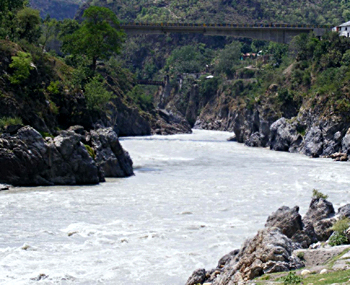 The five rivers of the upper basin of the Indus River form a delta upside down, traversed by rich valleys, while the lower course of the river is between two torrid deserts. The River Ganga runs through fertile land all the way, collecting the streams of the whole southern slope of the Himalaya, but divides its waters in a delta.
The five rivers of the upper basin of the Indus River form a delta upside down, traversed by rich valleys, while the lower course of the river is between two torrid deserts. The River Ganga runs through fertile land all the way, collecting the streams of the whole southern slope of the Himalaya, but divides its waters in a delta.
The geography of India explains the fundamental basis of Indian culture - unity amidst diversity. In the Indians there is a genuine love of the soil and its physical features. The religious culture is rooted to the soil. The geography and culture are intimately related. It was regarded as the Karmabhumi, the land with which all the efforts and activities of the Indians must be specially connected.
Racial Factor in Indian Culture
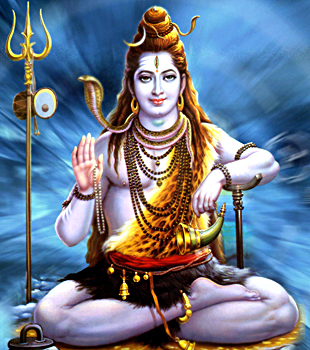 Racial factors are responsible for the shaping the Indian culture. Indian history explains the reason why the culture is so rich and multicoloured. Races after races have poured into India and lent their original contribution. Thus India has been referred to as a museum of races. The Proto-Austroloids survive in good many aboriginal people of present-day. The Mongoloid groups are found in Assam, Chittagong Hills and Bhutan. The Mediterranean people are in Kannacla, Tamil, Malayalani, Punjab, Gangetic Valley, Sindh, Rajputana and other places. The Brachycc-phals are well marked in West Bengal, Orissa, Kathiawar, Coorg, Gujarat, along the western coast of India. The Nordics who gave to India its Aryan speech, organisation, imagination, adaptability and basis of Indian culture are strong in North-West-Frontier, Punjab, Rajputana Kashmir, Upper Ganges Valley and in Maharashtra among the Chitpawan Brahmans.
Racial factors are responsible for the shaping the Indian culture. Indian history explains the reason why the culture is so rich and multicoloured. Races after races have poured into India and lent their original contribution. Thus India has been referred to as a museum of races. The Proto-Austroloids survive in good many aboriginal people of present-day. The Mongoloid groups are found in Assam, Chittagong Hills and Bhutan. The Mediterranean people are in Kannacla, Tamil, Malayalani, Punjab, Gangetic Valley, Sindh, Rajputana and other places. The Brachycc-phals are well marked in West Bengal, Orissa, Kathiawar, Coorg, Gujarat, along the western coast of India. The Nordics who gave to India its Aryan speech, organisation, imagination, adaptability and basis of Indian culture are strong in North-West-Frontier, Punjab, Rajputana Kashmir, Upper Ganges Valley and in Maharashtra among the Chitpawan Brahmans.
As a result of these races, the common life has been modified by amalgamating their characteristics and this has resulted in an evolution of a common Indian type and culture. For instance, it is probable that the cult of the ficus tree which is associated with fertility and the dead souls and some ideas about the path of the dead to paradise may have been derived from the Negritos.
The Mediterranean people represented chiefly by the Dravidians who have been responsible for the city culture. They have led India in international trade. Their language forms a solid block in South India. The Dravidians are responsible for commencing the cult of Lord Shiva, the worship of Mother Goddess or Shakti and also the institution of Yoga. They have also given India various symbols associated with these gods and goddesses. Many features of the temple architecture have been of the Dravidian origin. Among the articles of food the Dravidians have given wheat, rice, milk, pulses, vegetables, cotton dress, dwellings, counting on the basis of eight and few customs.
Thus one can derive that that both geography and the racial factors have considerably influenced Indian culture.
Geographical Influence on Indian Culture
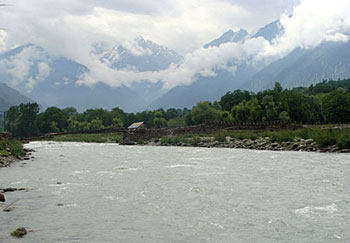 India in its original Persian sense meant the Sindhu River. The Greeks called it Indos, and by derivation, all the land lying beyond the Indus, both the Northern plains and the Deccan was given this name. The most ancient part of this vast country is the Deccan - which was an island when Hindustan was still under the sea. A volcanic upheaval which had submerged ancient lands gave the Deccan the peninsular shape, while in the north cretaceous sea-bottoms not only appeared above the water but rose to great heights.
India in its original Persian sense meant the Sindhu River. The Greeks called it Indos, and by derivation, all the land lying beyond the Indus, both the Northern plains and the Deccan was given this name. The most ancient part of this vast country is the Deccan - which was an island when Hindustan was still under the sea. A volcanic upheaval which had submerged ancient lands gave the Deccan the peninsular shape, while in the north cretaceous sea-bottoms not only appeared above the water but rose to great heights.
The Himalayan Mountains bounds India on the north, in a crescent tilted from north-west to south-east. India is closed on the north of its great river basins and on the east of Bengal. In the west, the right bank of the Indus is dominated by the highlands of Afghanistan and Baluchistan. The rest of the country is surrounded by the sea southwards. It grows very much narrow. The Deccan step at the Nilgiri Hills, east of Kozhikode, however is continued in a subsidiary massif which forms Cape Camorin. On the North it begins on the southern slope of the contrary valleys of the River Son and the River Narmada. Along the sides of the plateau run the Western Ghats and the Eastern Ghats. Along the northern edge of the Deccan are the Vindhya Mountains, which extend from the northern slope of the valley of the Narmada to the plains of the Ganges. In the west the Arravalli are the highest part of the terrace.
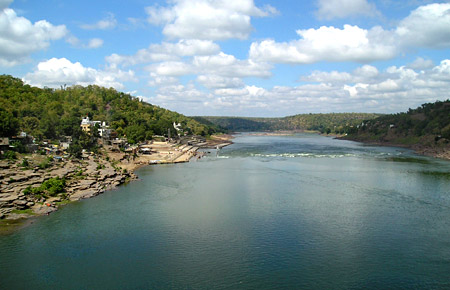 The rivers of the Deccan have broken the line of the Eastern Ghats into sections. The Himalaya itself is pierced by the Indus and its tributary the River Sutlej. The five rivers of the upper basin of the Indus are like a delta upside down while the lower course of the river is between two torrid deserts. The Ganges runs through fertile land and collects the streams of the whole southern slope of the Himalaya.
The rivers of the Deccan have broken the line of the Eastern Ghats into sections. The Himalaya itself is pierced by the Indus and its tributary the River Sutlej. The five rivers of the upper basin of the Indus are like a delta upside down while the lower course of the river is between two torrid deserts. The Ganges runs through fertile land and collects the streams of the whole southern slope of the Himalaya.
Geography of India has affected the course of her history and culture in several ways. The spirit of tolerance has been nurtured and fostered both, directly and indirectly by India`s geography. The vastness of the land and its climate has influenced the Indian mind. This has prepared in the mind a readiness to accept difference. The vast spaces offered room for slow infiltration by newcomers and allowed each locality, unhampered scope of development along its own lines. Indian climate generally makes one lethargic.
India`s geographical isolation and natural frontiers have given her sense of unity. The internal cohesion is matched by India`s sharp differentiation from all external lands. Nature has generously endowed her boundaries which has all the resources that man needs for a civilised and creative life. Common economic organisation has led to the development of common characteristics and a common outlook.
The geography of India explains the fundamental basis of Indian culture, unity amidst diversity. Simultaneously Indians have a genuine love of the soil and its fauna and flora, its rivers, mountains and valleys, its teeming life and ceaseless activity. It roused a geographical consciousness, a realisation of the territorial basis of the life of society. The religious culture is rooted to the soil. Geography and culture are intimately related. The conception of motherland was expressed by the name Bharat Varsha for the whole country. It was regarded as the Karmabhumi, the land with which all the efforts and activities of the Indians must be connected.
Influence of West on Indian Culture
 In the modern age the West has entered into India mainly through the British and so the story of India`s contact with the West is woven round the Indo British relationship that began developing after the fall of the Mughal Empire. For the first fifty years of the British Raj the attitude was one of indifference towards the Indians. This mood changed as the nineteenth century advanced and under the stress of the utilitarian and liberal philosophy born of the rising material and scientific progress in England it was realised that the Indians were very superstitious and uncivilised, that nothing good could be salvaged from the Indian culture and therefore they must be reformed. In the third period zeal for innovation was checked. The British in India looked at the Indians with a mixture of toleration and contempt.
In the modern age the West has entered into India mainly through the British and so the story of India`s contact with the West is woven round the Indo British relationship that began developing after the fall of the Mughal Empire. For the first fifty years of the British Raj the attitude was one of indifference towards the Indians. This mood changed as the nineteenth century advanced and under the stress of the utilitarian and liberal philosophy born of the rising material and scientific progress in England it was realised that the Indians were very superstitious and uncivilised, that nothing good could be salvaged from the Indian culture and therefore they must be reformed. In the third period zeal for innovation was checked. The British in India looked at the Indians with a mixture of toleration and contempt.
Western Influence on Literature
India discovered its ancient heritage through the efforts of a group of Europeans who took. It was through the efforts of Warren Hastings, Sir William Jones, Sir Charles Wilkins, Colebrook, Horace Wilson, James Prinsep and others that the ancient Sanskrit classics were introduced to India herself. Hodgson discovered the literature of Northern Buddhism. Roth published his treatise on the Literature and the History of the Veda in 1846. The English and other Europeans also led in the fields of archaeology, numismatics and other sources of history. Indians discovered themselves through the West. The printing press which has been another instrument of our national awakening was given by the West. The introduction of English as a medium of education has been a tremendous factor in the growth of modernism in India. The English literature is a literature of freedom. English books introduced new ideas. Sanskrit works were translated. Newspapers were started which helped India to keep contact with the outside world and also with the political, economic and social ills of the country.
Western Influence on Philosophy and Religion
In the philosophic field the West gave new philosophies of materialism, realism and idealism. Old beliefs were denounced. It produced a revivalist mentality. Raja Ram Mohan Roy had begun a school which rejected the evil, reformed old abuses and renovated the religious and social life.
The British gave all that led to scientific, technical and mechanical inventions. They had prepared the ground for the Indian renaissance. India was roused from its intellectual unconsciousness by contact with the West and turned to it for inspiration in economic and scientific fields specially.
Greek Influences on Indian Culture
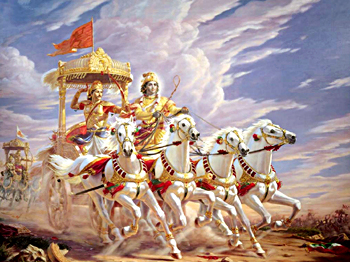 Greek civilization influenced India in the period after Alexander`s Indian campaign (circa 326 BC). Greek influences on Indian sculpture, literature and astronomy persist to this day and have become part of India`s cultural heritage.
Greek civilization influenced India in the period after Alexander`s Indian campaign (circa 326 BC). Greek influences on Indian sculpture, literature and astronomy persist to this day and have become part of India`s cultural heritage.
The Greeks left important influences on Indian culture after Greco-Bactrian warrior kings from Central Asia overran parts of northern India (and modern day Pakistan). Greek artistic techniques influenced Indian art via the Gandharan School of art and sculpture. Indian classical texts like the Mahabharata and the Yuga Purana make special mentions of the Greeks referring to them as the Yavanas (a term used also in the Hebrew Bible). The Greeks also influenced Indian astronomy- notably by introducing the signs of the Zodiac.
The Greeks in ancient India
Several Greco-Bactrian kingdoms were established in the wake of Alexander`s conquest of Central Asia. Alexander`s invasion of India was reportedly motivated by a desire to conquer the known world, but mutiny in the army and the approaching monsoons prevented a conquest of India. Following the Mauryan empire`s decline, the Greeks were able to overrun sections of north India, facilitating a strong Greek influence in Indian culture.
The Greeks and Classical Indian literature
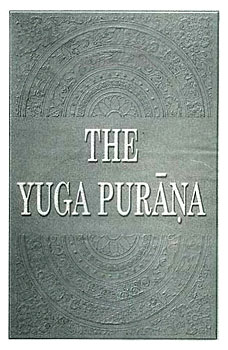 The Greeks find mentions in Indian Classical texts like the Yuga Purana and the Mahabharata, and Buddhist texts were also influenced by the Greek presence in Ancient India. The Greeks were known as Yavanas to the ancient Indians.
The Greeks find mentions in Indian Classical texts like the Yuga Purana and the Mahabharata, and Buddhist texts were also influenced by the Greek presence in Ancient India. The Greeks were known as Yavanas to the ancient Indians.
The Yuga Purana (composed circa. 250 BCE), describes the Indo-Greek invasions in detail. The text singles out Demetrius, a Greco Bacterian King for especial praise, referring to him as Dharmamitra, or `Friend of Dharma`. The Mahabharata, a major Indian epic, features Bhagadatta, described as a Yavana king; who plays a prominent role in the epic`s climactic war.
King Menander, a successor of the Greco-Bactrian king Demetrius, conquered large parts of northern India and features in a major Buddhist text, the Milindapanha (Questions of Milinda). A philosophical dispute about Buddhism, between Milinda and the Buddhist sage Nagasena, comprises the bulk of the text.
Greek influences on Indian Sculpture
Greek artistic techniques influenced Indian art largely via the Buddhist tradition and endured into the later Gupta period. The Greeks are notable for pioneering the anthropomorphic representation of the Buddha in Indian sculpture.
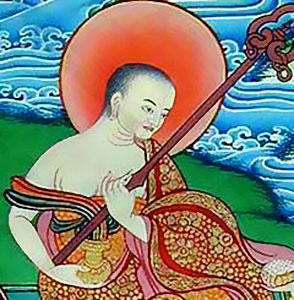 The Buddhists, oppressed by the eastern Sunga dynasty, sided with the Greeks in their campaigns, leading also to much artistic commerce between the two cultures. The Gandharan school of Buddhist art hence grew under strong Greek influences.
The Buddhists, oppressed by the eastern Sunga dynasty, sided with the Greeks in their campaigns, leading also to much artistic commerce between the two cultures. The Gandharan school of Buddhist art hence grew under strong Greek influences.
The Greek innovation of sculpting the Buddha in human form grew to become a major part of Buddhist iconography. The Greeks also introduced their own architectural and sculptural forms, like cupids, friezes and Corinthian columns into the Buddhist school. Several Greek mythological figures were incorporated into Buddhist architectural works, including Herakles, who became equated to Vajrapani, the mythological protector of the Buddha.
Greek techniques survived into the Gupta period, whose realistic anthropomorphic representations of the Buddha reflect the legacy of the Greek artistic influence.
The Greeks and Indian Astronomy
Indian astronomy is indebted to that of the ancient Greeks. The Gargi Samhita of the Yuga Purana credits the Greeks as the originators of astronomy, and Aryabhata attributes the Zodiac to the Greeks.
The Greek astronomical tradition introduced other innovations in Indian astronomy, like giving names to the days of the week and a more precise calculation of the year`s length
The Greeks influenced Indian culture thanks to a complex of social and political factors. Some of these influences persist to this day: the Milindapanha is a valued Buddhist text, Milind is a common Indian name, and the Zodiac is widely known in Indian astrological practice. Ancient Indian temples and especially Buddhist stupas are major Indian heritage sites. The Greek influence is now a prominent part of India`s cultural heritage.
Racial Influence on Indian Culture
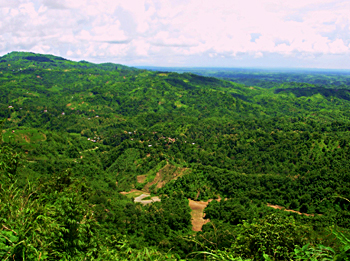 Racial influence on Indian culture has played a major role in shaping the Indian history and society as well. Fundamental thing about culture is its intimate association with historic development. The Indian history explains the reason why the Indian culture is so rich and multicoloured. End number of races has poured into India. They have lent their original contribution to it and have been assimilated in the Indian milieu. India has been called a museum of races.
Racial influence on Indian culture has played a major role in shaping the Indian history and society as well. Fundamental thing about culture is its intimate association with historic development. The Indian history explains the reason why the Indian culture is so rich and multicoloured. End number of races has poured into India. They have lent their original contribution to it and have been assimilated in the Indian milieu. India has been called a museum of races.
Different Types of Races in India
There has been a classification of Indian races recently. They are the Negritos, the Proto-Austroloids, the Mongoloid, the Mediterranean, the Western Brachycephals and the Nordic. Negritos are extinct though a small group survives in the Andamans, among the aboriginals of Kochi, Travancore Hills, Assam and the Rajmahal Hill tribes in Eastern Bihar. The Proto-Austroloids have steep forehead, snub nose with wide nostrils, retreating chin and thick-set body. The Mongoloid groups are found in Assam, Chittagong Hills. They have long head, flat nose, high cheek-bones and oblique slit-eyes. The Mediterranean people are found in Karnataka, Tamil Nadu, Kerala, Punjab, Sindh, Rajputana and Gangetic Valley. The Brachycephals are found in Bengal, Orissa, Coorg and Gujarat. They are short-headed. The Nordics who gave India its Aryan speech, organisation, imagination, adaptability and basis of Indian culture were strong in North-West-Frontier, Punjab, Rajputana Kashmir and in Maharashtra among the Chitpawan Brahmans and Upper Ganges Valley. They are tall, fair skinned with eyes either light brown or black.
Racial Contributions to Indian Culture
Some of the fundamental features of Indian culture have been derived from them. It is believed that their temperament is marked by superstitions, cheerfulness, love of music and gaiety, submissiveness, hard work, respect for convention and belief in the soul. They have dark skin and snub nose. They have also influenced the Aryan speech in many ways.
So far as the Hindu culture is concerned much of its basis is a contribution from the Dravidians. Among the articles of food, the Dravidians have given us wheat, rice, milk, pulses, vegetables, cotton dress, dwellings, customs like the- familiarity of the wife with her brother-in-law and respect for the brother-in-law elder to her husband, wedding customs, phonetic sounds and myths in the Indian Puranas. The Dravidians have adopted Sanskrit language and in common with the Aryans their Varna- System.
The racial factors have considerably influenced our culture. Aryans have given us through their philosophical, religious and spiritual ideas the original and fundamental basis of Indian culture.



















